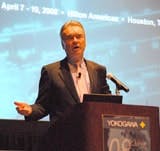Former Continental Chief Gives People Their Due
When Gordon Bethune took Continental Airlines from worst to first in the late 1990s, it wasn’t so much his doing as that of the people he was leading.
In his keynote address at the Yokogawa Users Conference in Houston, the former Continental chairman and CEO illuminated lightbulbs above attendees’ heads. On the heels of Yokogawa Corp. of America President and CEO Dave Johnson’s opening address, in which he reiterated the organization’s quest to become the world’s No. 1 industrial automation company, Bethune offered some insight into how his company made its way to the front of the line.
“Employee satisfaction is the foundation for customer satisfaction,” he said. “You need to show them the dignity and respect they deserve.”
Where Yokogawa’s market position is strong and poised for continued growth, Continental’s position in the early ’90s was not quite so solidly rooted. Continental was consistently last in every category the Dept. of Transportation ranked when Bethune decided to return to the airline industry. He had been with Braniff and Piedmont before accepting a position with Boeing. And the decision to move to Continental was not an easy one.
“When you look from outside a company, you can’t really tell how bad it is,” explained Bethune. “Dysfunctional organizations can’t implement anything successfully. We had been recapitalized, but we were running through that money. A bankruptcy judge can fix your balance sheet, but he can’t fix the company.”
“Employee satisfaction is the foundation for customer satisfaction,” says former Continental chief Gordon Bethune on the business case for offering employees the dignity and respect they deserve.
“We were in tenth place out of 10,” he explained. “What do customers want in an airline? How do they measure success? ‘Get me there on time with my underwear.’”
Twenty percent of Continental’s flights were cash-negative, so he decided to fly people where they wanted to go. A simple idea, but one that first required some help.
“We were a highly leveraged company, and unlike the old Continental, we decided to honor our commitments to our business partners,” said Bethune. “We honored every obligation we had.”
That became the cornerstone of Continental’s financial plan—Fund the Future—which is still being used today. From a market perspective, Bethune identified key strengths in Cleveland, Newark, N.J., and Houston, and then he developed Continental’s Latin American markets. “Today, Continental is the No. 2 Latin America carrier,” he bragged.
But the airline’s success was built on the backs of its employees. Because reliability was the customer’s primary desire, Bethune looked at how the carrier’s reliability problems were impacting the bottom line. “We were spending $6 million a month to be late,” he said. “We needed to make reliability work for Continental, so we decided to give a share of that $6 million to every person in the company if we met our goals.” That translated into about $65 per employee, which turned out to be money well spent, or at least well redistributed.
“We would put our on-time percentages up in the break rooms,” he explained. “That was the measure of success. Continental became the most reliable airline in America, and Continental’s employees still look for their checks each month.”
The carrier used daily news updates and a weekly CEO voicemail with information on the company’s progress.
“Do you know of any successful companies that have people who don’t enjoy working there?” asked Bethune. “People came to work for that and because we treated them with respect. We put our customers, our employees and our shareholders in the same boat by saying that 15% of pretax income was going to employees.”
Bethune realized that being the CEO wasn’t enough to make the company right. He needed buy-in. He was the tenth CEO in 10 years at Continental. He understood that he had to motivate employees to do what needed to be done.
“I own the lake where I fish, but I still have to use bait,” he explained. “The difference between winning and losing is very small. In our business, it’s the difference between the mechanic who wants to do it and the one who doesn’t. It’s the way you treat your people. This is not higher-order math. You just need to decide what you use to measure success.”


